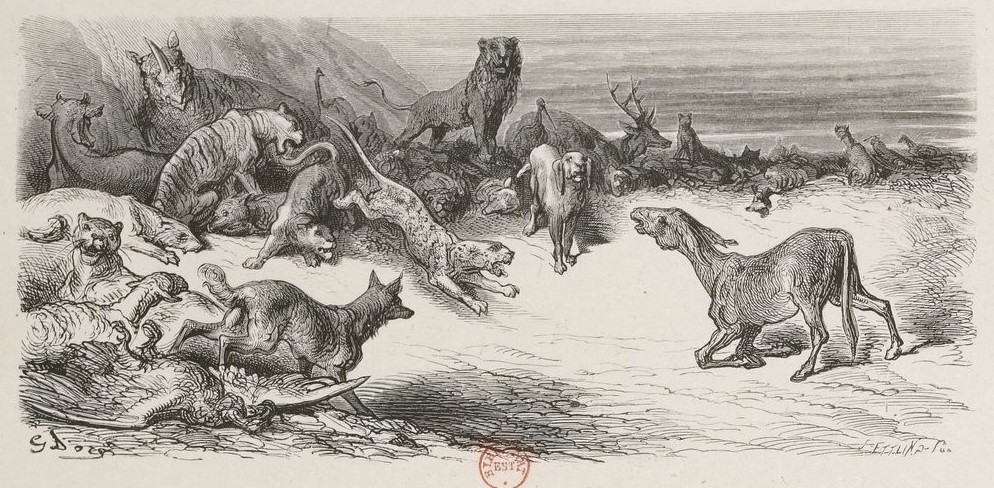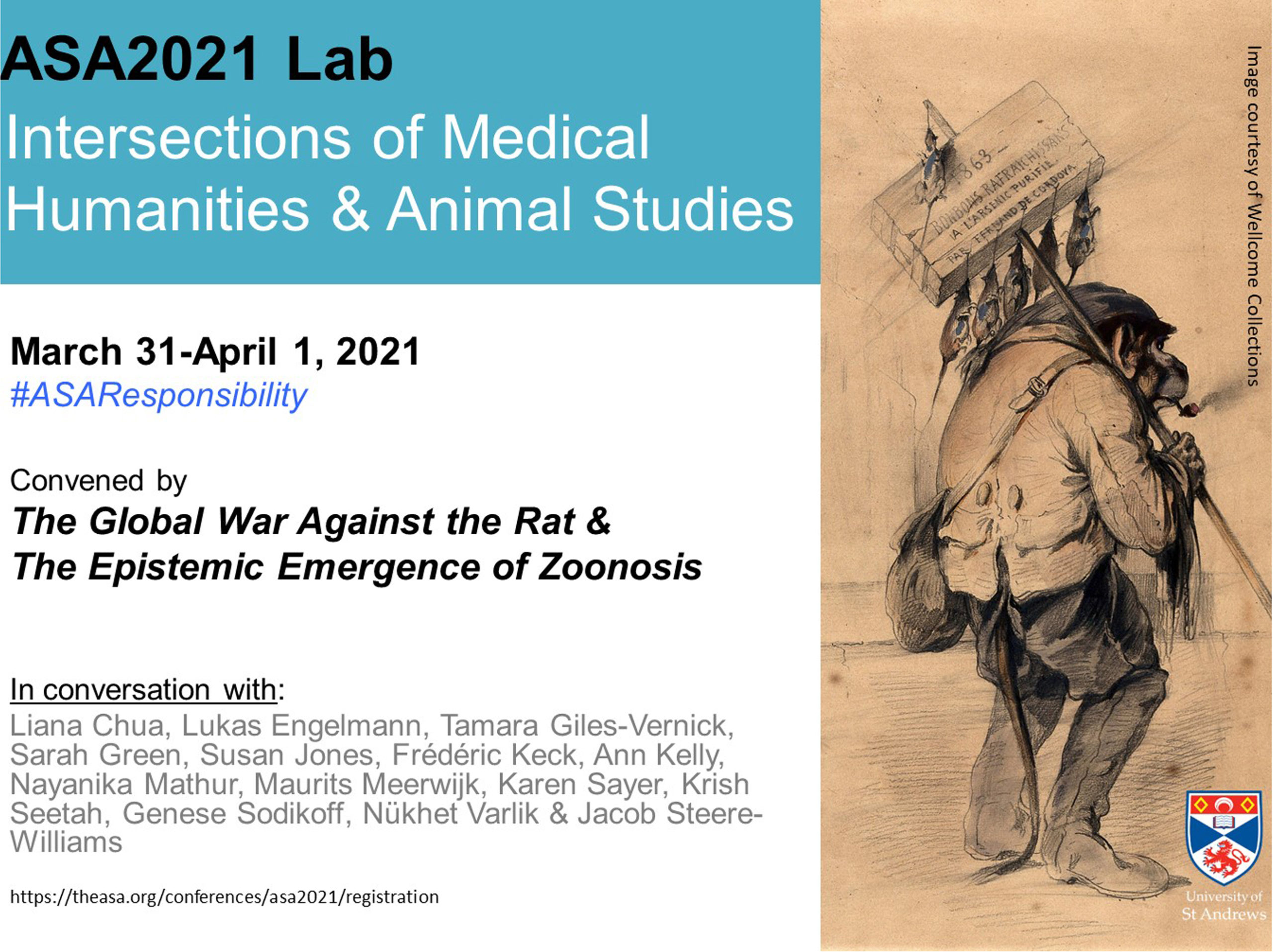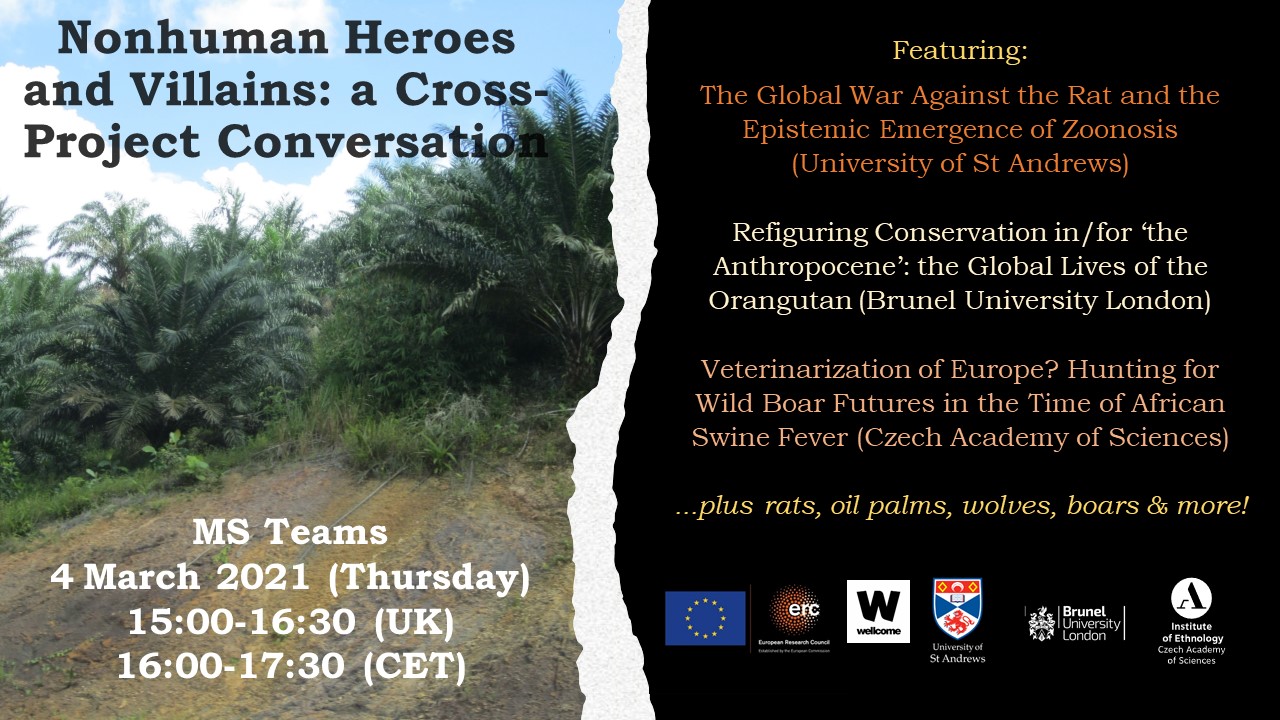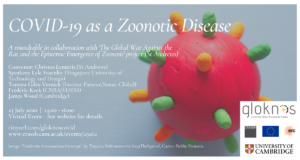Events
Panzootics, Beyond Pandemics and Zoonoses
P004 at the 18th EASA Biennial Conference, EASA2024: Doing and Undoing with Anthropology, University of Barcelona, 23-26 July 2024 (exact date TBC).

La Fontaine, Les animaux malades de la peste – etching by Gustave Doré, Courtery of Gallica
Panel Convenors: Christos Lynteris (St Andrews) and Frédéric Keck (CNRS/EHESS/ Collège de France)
Christos Lynteris and Frédéric Keck will be convening Panel 004 of the 18th EASA Biennial Conference (Barcelona, July 2024) on the topic of “Panzootics, Beyond Pandemics and Zoonoses”
In the past three years a global epidemic phenomenon has been unfolding, drawing much less attention or intervention that the Covid-19 pandemic. Known as a panzootic, this is a phenomenon that affects non-human animals. At present, two distinct panzootics are underway. First, SARS-CoV-2, Covid’s pathogen, has spilled-back to nonhuman animals, both domesticated and wild, establishing what scientists believe to be vast reservoirs of the virus. Second, a highly pathogenic influenza strain, H5N1, has been affecting and decimating populations of domestic and wild birds, as well as maritime mammals across the globe. The panel invites talks on the phenomenon of the panzootic, including both diseases that affect populations of one species across the globe, and diseases that spread across species on global scales. Bringing together anthropologists to discuss panzootics as a global challenge for the first time, the panel will allow participants to define together an emerging field of investigation and conceptualisation at the crossroads of medical anthropology and multispecies ethnography.
Panel Programme coming soon
Workshop, November 4 2022
Rural and Agrarian Disease Knowledge: Historical and Ethnographic Perspectives

A workshop convened by Inanna Hamati-Ataya, Christos Lynteris, and Matheus Alves Duarte da Silva.
History of medicine and science accounts have commonly portrayed cities as the vectors of knowledge innovation, political modernisation, and globalisation. In this scheme, the rural has appeared at times as ahistorical and conservative, waiting to be sanitised, modernised, and incorporated into the global world thanks to dynamics set up in metropolises such as New York, Antwerp, Rio de Janeiro, Mumbai, or Cape Town.
This picture has, however, been challenged by recent studies, ranging from historical research on the role of plantations in shaping capitalist inequalities, to sociological examinations of the intersections between rural zoonotic diseases and nation-building projects, to ethnographic descriptions of emerging infectious disease “hot zones” at the border between rural zones and “wild” spaces.
The workshop Rural and Agrarian Disease Knowledge: Historical and Ethnographic Perspectives will discuss the epistemic co-constitution of the rural/agrarian and infectious diseases by asking: how have human interactions with infectious diseases impacted ways of knowing and acting on rural and agrarian spaces and environments? And, in turn, how have human interactions with rural and agrarian spaces and environments impacted ways of knowing and acting against infectious diseases? Moreover, how has the rural been configured either as a space of health or sickness over the centuries and around the globe? Which role did rural and agrarian landscapes play in the epistemic emergence of microbiology and tropical medicine, both as spaces for sanitary interventions and as places of knowledge? How did sanitary, microbiological and epidemiological dynamics taking place in rural and agrarian settings interact with and co-participate in global processes such as European imperialism, the emergence of capitalism, and post-colonial nation-building projects?
The result of a collaboration between The Global War Against the Rat and the Epistemic Emergence of Zoonosis Wellcome-funded project (University of St Andrews), the ERC-funded project The Global as Artefact and the Centre for Global Knowledge Studies (gloknos, University of Cambridge), the workshop will take place in hybrid (in person and online) form, with the in-person event being based at the Centre for Research in the Arts, Social Sciences and Humanities (CRASSH), University of Cambridge. For Covid-protection reasons, the event will be open to non-speakers only online. You can view the abstracts and to register, please email [email protected].
- 09:00-09:15 Welcome and Introduction
- 09:15-10:45 Panel 1
- Gregg Mitman (Ludwig-Maximilian-Universität/University of Wisconsin-Madison) From the City to the Jungle: The Remaking of Yellow Fever in West Africa
- Christos Lynteris (St Andrews) The Epidemiological and Epistemic Emergence of “Rural Plague” in Argentina (1920-1950)
- Karen Sayer (Leeds Trinity) The View from the Land, Disease Control through the Built Spaces of British Agriculture 1947-1980
- 10:45-11:00 Coffee Break
- 11:00-12:30 Panel
- Caroline Mburu (St Andrews) “Show us the Bacteria!”: Tensions and Contestations of Brucellosis Disease Control in Rural Tanzania
- Cristiana Bastos (University of Lisbon) That Knowledge You Brought on Your Empty Hands: Domestic Healing among Madeiran Laborers in Plantation Hawaii
- Oliver French (St Andrews) Bringer of Light and Death: Phosphorus and the Crusade Against Rats in the Third Plague Pandemic
- 12:30-13:30 Lunch Break
- 13:30-15:00 Panel 3
- Freya Jephcot (Cambridge) and Jacob Steere-Williams (Charleston) Demarcating the ‘Field’ of Field Epidemiology
- Jules Skotnes-Brown (St Andrews) Extracting Blood, Flies, and Ideas: David and Mary Bruce, Zulu Experts, and Shifting Geographies of Health in Rural Zululand c. 1870s-1900s
- Maurits Bastiaan Meerwijk (Leiden University/Health Council of the Netherlands) Yaws: Medicine and Propaganda in Rural Java
- 15:00-15:15 Coffee Break
- 15:15-16:45 Panel 4
- Lina Pinto Garcia (Universidad de los Andes/Oxford) Leishmaniasis knowledge and practices in the midst of war: lessons for a peace building process in Colombia
- Juan Pablo Zabala (CONICET/UNLA) Making a Scientific Career out of a Controversial Rural Disease: Salvador Mazza and Chagas’s Disease at the Mission for the Study of Regional Pathologies, Argentina 1926-1946
- Matheus Alves Duarte da Silva (St Andrews) Plague in the Backlands: Rats, Rural Spaces, and Epidemiological Reasoning in Brazil (1925-1955)
- 16:45-17:00 Coffee Break
- 17:00-18:00 Roundtable
- Inanna Hamati-Ataya (Cambridge)
- Raphael Uchôa (Cambridge)
- James Wood (Cambridge)
Online Symposium, December 14 2021
From Zoonotics to Anthroponotics:
The Past and Present of Disease Transmission between Animals and Humans

This online symposium organised by The Global War Against the Rat and the Epistemic Emergence of Zoonosis project in collaboration with Monica H. Green is centered around the recent findings of the transmission of SARS-CoV-2 within white-tailed deer populations in the United States. The ability of the new coronavirus to transmit within captive animal populations (mink and zoo animals) was already documented in 2020. Transmission into wild animal populations, however, raises issues of broader consequence, both for present disease management and surveillance and also long-term control of the disease. The symposium will feature a keynote by Professor Suresh Kuchipudi (Penn State University), and a panel and roundtable that will bring together and discuss evidence of documented cases of disease spread from humans into wild animal populations (and back again) from the perspectives of history, anthropology, and virology.
Program (times are GMT)
- 14:00-14:15 Welcome and Introduction
- 14:15-15:00 Keynote: Professor Suresh Kuchipudi (Penn State University)
- Q&A Chair: Christos Lynteris (University of St Andrews)
- 15:00-16:15 Response Panel 1, Chair: Jules Skotnes Brown (University of St Andrews)
- Monica H. Green (Independent Scholar)
- Janet Cox Singh (University of St Andrews)
- Matheus Alves Duarte da Silva (University of St Andrews)
- Ilana Löwy (CNRS)
- 16:15-16:30 Break
- 16:30-17:30 Response Panel 2, Chair: Matheus Alves Duarte da Silva (University of St Andrews)
- Jules Skotnes Brown (University of St Andrews)
- Frédéric Keck (EHESS/CNRS)
- Tamara Giles-Vernick (Institut Pasteur/ SONAR-GLOBAL project)
- 17:30-18:30 Roundtable, Chair: Monica H. Green (Independent Scholar)
- Sarah Green (University of Helsinki)
- Christos Lynteris (University of St Andrews)
- Kevin Bardosh (University of Washington)
- Jo Sharp (University of St Andrews)
- 18:30-18:45 Closing Remarks
Registration: The event will be run on Microsoft Teams. The event is free but requires registration. To register, please contact Lynn Hynd at [email protected] by December 9 15:00 GMT. Please use “From Zoonotics to Anthroponotics” as the subject of your message
Webinar – 15 to 16 June 2021
Microbes and Microbiology: towards new stories?

Registration is free
To register please contact [email protected] by June 14 2021
While a new virus halts activities at a global level and bacteria resistant to antibiotics raise concerns among international health authorities, academic studies on microbiology have multiplied in the last ten years and shed light on the meanings of these arising questions. What are the different ways in which humanities describe microbiology, this multifaceted and complex object that, for more than a century, has given rise to various investigations, whether in the context of national histories, institutional studies, or scientific controversies? This webinar proposes to make an inventory of contemporary research in humanities on microbiology and to understand how this research has been transformed by the various “turns” in social sciences over the last decades – global turn, imperial turn, material turn, animal turn, to name but few. Beyond simple academic labels, what are, in concrete terms, the new questions, new objects, new methods, and approaches currently shaping our understanding of the emergence of the science of microbes, and of the technical and social changes it has spawned until the present day?
Day 1 – 15 June 2021
(All times are in Central European Summer Time – UTC+02:00)
Introduction – 15h00 to 15h15
- Matheus Duarte (University of St Andrews)
- Mathilde Gallay-Keller (Doctorante, CNRS, EHESS, LAS, PALOC)
Panel 1. Pandemics and new centers of microbiology – 15h15 to 16h50
- Chair: Matheus Duarte (University of St Andrews)
- Frédéric Vagneron (Université de Strasbourg, DHVS)
Des virus en quête de maladie. Quelques réflexions à partir des cas de la grippe et de la myxomatose - Shiori Nosaka (Doctorante, EHESS, Cermes3)
Inventer à la frontière des empires : recherches et pratiques des vaccins antipesteux en Asie au début du XXe siècle - Juan Pablo Zabala and Nicolás Facundo Rojas (CONICET)
Here comes the bubonic plague! Health policies and scientific knowledge production in Buenos Aires, 1899-1930
Break (10 minutes)
Panel 2. Shared landscapes between humans and microbes – 17h00 to 18h30
- Chair: Christos Lynteris (University of St Andrews)
- Elise Tancoigne (Université de Lausanne)
Relocalizing microbes. Food microbiology and the making of autochthonous dairy starter cultures - Mayra Bertussi (Universidade de Campinas)
Les « nouveaux » garants du terroir : l’usage de l’écologie microbienne dans la reconnaissance de la qualité des fromages - Hannah Landecker (UCLA) & Louis-Patrick Haraoui (Université de Sherbrooke)
Antibiotic Resistant Landscapes: How Microbes and Mobile Genetic Elements Make Maps of Human Society
Break (10 minutes)
Keynote address – 18h40 to 19h40
- Aro Velmet (University of Southern California)
- Pasteur’s Empire: Scale and Technology in the Politics of Colonial Tuberculosis
Day 2 – 16 June 2021
Panel 1. Working with microbes beyond institutional spaces – 10h00 to 12h00
- Chair : Mathilde Gallay-Keller (Doctorante, CNRS, EHESS, LAS, PALOC)
- Alice Doublier (CNRS, CCJ-Chine, Corée, Japon)
Des microbes qui font rêver. Petites (et grandes) histoires de brasseurs dans le Japon contemporain - Juliette Salme (Doctorante, Université de Liège, LASC, IRSS)
Merveilleux mycélium : collaborations à tâtons entre humains et champignons au sein de laboratoires belges de biologie do-it-yourself - Mary Picone (CNRS/EHESS-CCJ-Chine, Corée, Japon)
Japanese Scientists and the Performance of Funerary Rites for Microbes - Guillaume Bagnolini (Université Paris-Est Marne-la-vallée, LISIS)
Pratiques et discours de la microbiologie de garage
Lunchtime
Panel 2. Promises and limits of microbiology and its alternatives – 14h00 to 16h00
- Chair: Frédéric Keck (CNRS, Collège de France, EHESS)
- Kylian Godde (Doctorant, EHESS, Cermes3)
L’antibiorésistance comme objet-frontière : une analyse des circulations entre microbiologie et clinique - Victoria Lee (Ohio University, Institut d’études avancées de Paris)
Fermentation Science as Coevolutionary History - Élise Demeulenaere (CNRS, Centre Alexandre Koyré) & Mathilde Lagrola (Doctorante, AgroParisTech, SENSE, Université Paul Valéry-Montpellier 3)
Du « catalogue de germes » aux équilibres microbiens. Une communauté de connaissances et de pratiques autour du maintien de la typicité des fromages de terroir - Thomas Bonnin (Rattaché au projet ANR « Epancopie », Université de Clermont-Ferrand)
Phagothérapie : obstacles et enjeux autour de « virus guérisseurs »
Break (10 minutes)
Conclusion – 16h10 to 16h30
- Mathilde Gallay-Keller (Doctorante, CNRS, EHESS, LAS, PALOC)
- Matheus Duarte (University of St Andrews)
Organization
- Matheus Alves Duarte da Silva, Postdoctoral Research Fellow, University of St Andrews
- Mathilde Gallay-Keller, doctorante en anthropologie, CNRS, EHESS, Laboratoire d’Anthropologie Sociale & Laboratoire PALOC
ASA2021 Lab | Intersections of Medical Humanities & Animal Studies: Methodological and Interdisciplinary Dialogues and Challenges – 31 March & 1 April 2021
 Held at ASA2021, the Annual Conference of the Association of Social Anthropologists of the UK & Commonwealth #ASAResponsibility and convened by the Global War Against the Rat and the Epistemic Emergence of Zoonosis project, this lab will bring together scholars from across disciplines to share and discuss methodological and interdisciplinary questions, challenges and collaboration pathways at the intersection of the Medical Humanities and Animal Studies. Each session will focus on a theme that will allow participants to discuss in free-format questions and challenges in their respective research field with the aim of sharing experiences and methodological tools, as well as ideas of expanding and unsettling interdisciplinary collaboration.
Held at ASA2021, the Annual Conference of the Association of Social Anthropologists of the UK & Commonwealth #ASAResponsibility and convened by the Global War Against the Rat and the Epistemic Emergence of Zoonosis project, this lab will bring together scholars from across disciplines to share and discuss methodological and interdisciplinary questions, challenges and collaboration pathways at the intersection of the Medical Humanities and Animal Studies. Each session will focus on a theme that will allow participants to discuss in free-format questions and challenges in their respective research field with the aim of sharing experiences and methodological tools, as well as ideas of expanding and unsettling interdisciplinary collaboration.
Convenors
- Matheus Alves Duarte da Silva (St Andrews)
- Oliver French (St Andrews)
- Christos Lynteris (St Andrews)
- Jules Skotnes-Brown (St Andrews)
Programme
31 March 2021 14:15-15:45 (BST) | Session 1: Epidemiology
- Lukas Engelmann (University of Edinburgh)
- Genese Sodikoff (University of Rutgers)
- Ann H. Kelly (King’s College, London)
- Nükhet Varlik (University of Rutgers)
- Jacob Steere-Williams (College of Charleston)
- Respondent: David Napier (UCL)
31 March 2021 16:30-18:00 (BST) | Session 2: Zoonosis
- Tamara Giles-Vernick (Institut Pasteur)
- Sarah Green (University of Helsinki)
- Frédéric Keck (CNRS-Collège de France-EHESS)
- Krish Seetah (Stanford University)
- Susan Jones (University of Minnesota)
- Respondent: Lisa Boden (University of Edinburgh)
1 April 2021 09:00-10:30 (BST) | Session 3: Environment & Animals
- Liana Chua (Brunel University London)
- Nayanika Mathur (University of Oxford)
- Maurits Meerwijk (Hong Kong University)
- Karen Sayer (Leeds Trinity University)
- Respondent: Janet Cox-Singh (St Andrews)
Webinar | Nonhuman Heroes and Villains: A Cross Project Conversation – 4 March 2021 15:00-16:30 (GMT)/ 16:00-17:30 (CET)

Webinar convened by The Global War Against the Rat and the Epistemic Emergence of Zoonosis (University St Andrews), Refiguring Conservation in/for “the Anthropocene”: the Global Lives of the Orangutan (Brunel University London) & Veterinarization of Europe? Hunting for Wild Boar Futures in the Time of African Swine fever (Czech Academy of Sciences)
Tales of heroism, villainy, accolades and blame have long been filled with nonhuman entities, ranging from plants to ‘unloved’ critters (Rose & van Dooren 2011). In this cross-project webinar, members of The Global Lives of the Orangutan, The Global War Against the Rat and the Epistemic Emergence of Zoonosis, Veterinarization of Europe? Hunting for Wild Boar Futures in the Time of African Swine Fever get together to discuss the more-than-human discourses, politics and ontologies of which some nonhuman ‘heroes’ and ‘villains’ emerge and make their presence felt. Join us for short interventions on wolves, pigs, rats, oil palms and orangutans, followed by questions and a general discussion. All welcome!
Registration for this event is now closed
Programme
This webinar will involve short (c. 5-7 minute) interventions from each presenters, which are grouped into three themed panels. These will then be followed by an open discussion and Q&A.
Panel 1: Productions
- Feeding Extinction: Navigating the metonyms and misanthropy of palm oil boycotts| Hannah Fair (Global Lives of the Orangutan project, Brunel University London)
- Economic Zoology: A science of animal friends and foes, 1880s-1930s | Jules Skotnes-Brown (Global War Against the Rat project, University of St Andrews)
- Becoming Feral: A Tale of Two Pigs | Paul G. Keil (Hunting the Unruly Pigs of the New Wild project & Veterinarization of Europe project, The Czech Academy of Sciences)
Panel 2: Evaluations
- Not All Wolves Are Equal: Selective villainization among species populations | Erica von Essen (Veterinarization of Europe project, The Czech Academy of Sciences)
- Good and Bad Primates| Paul H. Thung (POKOK, Global Lives of the Orangutan project associate)
Panel 3: Politics
- Palm Oil – The Villain as Hero | Viola Schreer (Global Lives of the Orangutan project, Brunel University London)
- Symbol of Modernity or Proof of Archaism? The ambiguity and political uses of rat-catching in Brazil (1900-1914) | Matheus Alves Duarte da Silva (Global War Against the Rat project, University of St Andrews)
General discussion and Q&A
Abstracts
Symbol of Modernity or Proof of Archaism? The ambiguity and political uses of rat-catching in Brazil (1900-1914) | Matheus Alves Duarte da Silva (Global War Against the Rat project, University of St Andrews)
The presentation will focus on the political uses of rat-catching in Brazil, showing the ambiguities of both the rat and Brazilian society. To the hygienists, rat-catching was a rational model to face plague, and a national success; to the press and popular sources, it was the symbol of governmental failures that ended up creating a “rat” market.
Not All Wolves Are Equal: Selective villainization among species populations | Erica von Essen (Veterinarization of Europe project, The Czech Academy of Sciences)
Just as Nils Christie presented criteria for the ‘ideal victim’ in criminology, so too we may conceptualize the wolf’s culturally attributed bloodthirst, cowardice, cruelty in the face of its prey and transient vagabond nature across landscape as an ‘ideal villain’. In this talk, I consider how wolf skeptics nowadays selectively villainize individual wolves rather than the species. Informing new insights onto scholarship on ‘animals out of place’ with perspectives from environmental communication, I discuss how this selective villanization represents an attractive discursive strategy for wolf skeptic hunters and farmers. That is, they are able to endorse a hypothetical ‘right to exist’ for wolves as a species, but impose so many genetic, morphological, spatial, and behavioral parameters guiding its actual allowable conduct in practice that no actual wolves ever approximate the lofty standards set by its species norm. I enquire about the origins of this strategy, the extent to which it is a strategy or genuine conviction.
Feeding Extinction: Navigating the metonyms and misanthropy of palm oil boycotts| Hannah Fair (Global Lives of the Orangutan project, Brunel University London)
Among UK-based orangutan conservation supporters palm oil consumption boycotts are widespread, due to the ecological impacts of oil palm cultivation on orangutan habitat. Yet these boycotts are largely at odds with the stances of orangutan charities. Drawing on interviews with orangutan supporters, I explore why some Global North consumers are so consumed by palm oil. Palm oil is viewed by orangutan supporters as insidious, invasive and cheap and forces a bodily complicity with orangutan suffering. It is mobilized as a metonym for human greed and capitalist destruction, while the figure of the orangutan is made to stand in for the precarity of nonhuman life. This metonymic relationship mirrors broader Anthropocenic framings of Human-Nature relations, which emphasize Humanity as a universal actor. Yet the practices of ‘species guilt’ associated with these framings largely mitigate against a decolonizing model of conservation, as they have the potential to deny agency to workers and villagers enmeshed within the oil palm economy.
Becoming Feral: A Tale of Two Pigs | Paul G. Keil (Hunting the Unruly Pigs of the New Wild project & Veterinarization of Europe project, The Czech Academy of Sciences)
In Australia, free-roaming pigs are constructed as villainous through the term “feral.” This presentation will explore the historical events through which pigs were made feral, and how this branding attempts to unmake this adaptable animal’s (almost heroic) capacity to overcome categorical divides and forge new relations and identities.
Good and Bad Primates| Paul H. Thung (Project on the Keys to Understanding Orangutan Killing, honorary Global Lives of the Orangutan project associate)
In rural Borneo, the legitimacy of wildlife protection is measured in part by the moral character of the specific species. Well-mannered animals are deemed more deserving of protection than mischievous ones. While the character of orangutans is ambiguous and judged varyingly, there is consensus about two other primate species. In this presentation I contrast the local villain status of the Beruk (pig-tailed macaque) with the hero status of the Kelempiau (gibbon). By examining these two extremes, I suggest that judgements of the moral character of a species are based not just in experience of human-wildlife conflict or myths, but also in direct observation of behaviour, stories of human-primate encounters, and everyday discourse.
Palm Oil – The Villain as Hero | Viola Schreer (Global Lives of the Orangutan project, Brunel University London)
This provocation provides a counter-image to the portrayal of palm oil as ecological villain. While Anthropocenic discourses and knowledge condemn palm oil development for deforestation, biodiversity loss, and carbon emissions, these truth-claims are challenged by alternate scientific knowledge that downplays the ecological costs of palm oil development in Indonesia. Backed by this alternative expertise, I show how palm oil industry-affiliated actors celebrate palm oil not only as national hero (pahlawan bangsa) contributing to foreign currency earnings, economic development, poverty alleviation, and national integrity, but even create an image of palm oil as environmental hero.
Economic Zoology: A science of animal friends and foes, 1880s-1930s | Jules Skotnes-Brown (Global War Against the Rat project, University of St Andrews)
This talk examines how economic zoologists – scientists who calculated the utility or harmfulness of wildlife to commerce and public health – shaped conceptions of animals as heroes or villains. Located initially in the USA, and later across the globe, these scientists created economic taxonomies of animal life, which ultimately shaped conservation and pest control in southern Africa.
Webinar | Covid-19 as a Zoonotic Disease – July 23 2020 14:00-16:00

A roundtable at gloknos in collaboration with The Global War Against the Rat and the Epistemic Emergence of Zoonosis project (University of St Andrews)
The Covid-19 pandemic is caused by a zoonotic virus, SARS-CoV-2; in other words, a virus which has spread from animals to humans. This roundtable discusses the way in which different animals and forms of human-animal contact have come to be understood and framed in the context of the pandemic. In which ways does the pandemic confirm, trouble or scientific anticipations of zoonotic emergence? To what extent do framings of COVID-19 as a zoonotic disease reflect broader anxieties about human interaction with the environment? Why have ‘wet markets’ become the main loci of blame for zoonotic emergence? And how can we develop an approach to the zoonotic aspect of the disease that is grounded in both disease ecology and ethnographic understandings of animal-human interaction?
- Event information on the gloknos website
- Event information on the CRASSH website
- You can watch the recorded webinar via gloknos’s YouTube channel
Convenor
- Christos Lynteris (St Andrews)
Speakers
- Lyle Fearnley (Singapore University of Technology and Design)
- Tamara Giles-Vernick (Institut Pasteur/Sonar-Global)
- Frédéric Keck (CNRS/EHESS)
- James Wood (Cambridge)
